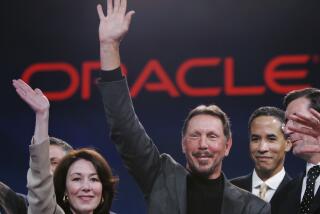Estimates Vary Widely on Future Disney Profit
- Share via
Jeffrey Katzenberg’s expert witness and a Walt Disney Co. lawyer clashed Tuesday over how rosy the future is for Disney products since the profit will be used to calculate Katzenberg’s lucrative bonus.
Katzenberg, the former head of Disney’s movie studio, is suing the company for at least $250 million, representing what he contends is his share of future profits of all films and merchandise generated during his 10 years there.
For the phase of the trial being held to calculate the size of the bonus, Katzenberg called Microsoft Corp. technology expert Nathan Myhrvold, who predicted a future full of high-tech opportunities for entertainment companies. Myhrvold spoke of everything from homes that will be able to receive movies on demand over the Internet or satellite to “smart toys” that will dance along with children’s television shows.
These and other advancements could occur in five to 10 years on a widespread basis, Myhrvold said.
But Disney’s lawyers suggested the future was not as bright as the expert predicted. George Caplan, in a brief opening statement, said Katzenberg’s estimate of future video sales didn’t take into account the widespread piracy in China and India that affects even first-run movies. “Because of piracy, [most Disney films are] virtually all on the streets of China today. And India,” he said.
Katzenberg calculated that $80 million of his bonus should come from more than $4 billion in business in China and India, but Disney collected less than $1 million in revenue last year from those countries, Caplan said.
Myhrvold countered that China was willing to help thwart piracy and technology would soon help with such efforts.
The trial, which has allowed the high-profile row between Katzenberg and former boss, Disney Chairman Michael Eisner, to become public, is now focused on the question of how much money Disney can be expected to make for the rest of time off some of its best-known products, including “The Lion King” and “Aladdin.”
Katzenberg says his contract guaranteed him a lump-sum incentive bonus worth 2% of those future profits, payable two years after he left Disney in 1994. After Disney didn’t pay the bonus, Katzenberg filed suit.
Myhrvold was quickly drawn into the bitter side of the lawsuit, as Disney senior executive and attorney Sanford Litvack sought to show his opinions were shaded, in part, by his close ties to Katzenberg.
Litvack suggested Myhrvold even offered a way for Katzenberg to streamline the litigation by simply offering to buy all of the Disney products at issue, knowing that Disney would turn him down.
Myhrvold acknowledged he did make that suggestion, but only because Disney’s own estimates of the value of its products were so low.
More to Read
The biggest entertainment stories
Get our big stories about Hollywood, film, television, music, arts, culture and more right in your inbox as soon as they publish.
You may occasionally receive promotional content from the Los Angeles Times.










